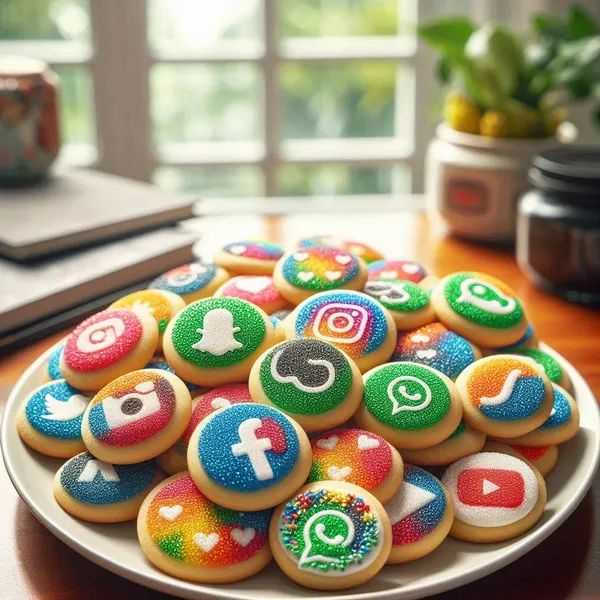If you give Meta a cookie, Meta will ask you for a selfie to accompany it.
When you give Meta the selfie, Meta will ask you to use a filter to make it snappy.
Once you think you look happy, Meta will want you to post it on your digital space.
When you post it on the wall, all of Meta’s followers will know your face.
Meta’ll start sending notifications, which you will want to check,
You will scroll through your feed, and find a video next.
You will watch one, then two, then three, then four,
And before you know it, you’re watching more and more.
As you scroll and scroll, your eyes will grow wide,
With every new post, you’re taken for a ride.
You will see pictures of pets, parties, and toys,
And you’ll feel like you’re missing out on all the joys.
You will want to post more, to show you’re having fun,
But the clock will tick, and the day will be done.
You will have spent all your time in a virtual spree,
Missing out on real adventures, as good as they can be.
Meta’s AI algorithms will steer your likes, interests, every whim,
They’ll feed you content, making real-life look dim.
The more you engage, the harder for you to break free,
From the digital world, as vast as the sea.
As night falls late, you and your phone's energy abate,
You'll see how quickly time can evaporate.
Understand that each like, each share,
Cannot equate to the moments lived with care.
Soon, with a cookie in Meta’s hand, you will understand
That life is more than a social media brand.
It’s about making memories, not just pics, tiks, vids and posts,
And that’s what truly matters the most.
So, let’s take a lesson from this tale,
And not let your real lives grow stale.
For every minute on the screen,
Is a minute from our dreams, unseen.
Let’s laugh and play, and live out loud,
Away from Meta’s scrolling, digital crowd.
Before we give Meta a cookie, let's make a vow,
To spend more time in the real world, starting now!
About this Adaptation and Parody
This story playfully reimagines the classic 'If You Give a Mouse a Cookie' format to explore the challenges of balancing social media with real-world experiences for children. Echoing Laura Joffe Numeroff’s circular narrative structure and cause-and-effect storytelling, this parody of the “If You Give a Mouse a Cookie” format serves as an allegory for the potential pitfalls of social media engagement. It reminds children that while social media can be fun, enjoying life beyond the screen is more important.
Inspired by Alisyia Finley's Wall Street Journal article, "If You Give a College Student a Cookie, I wondered how collaborating with an AI might produce a similar parody of social media.
How Writing is Changing in the Age of AI
Writing is undergoing a transformation. AI-powered writing tools can streamline tasks like idea generation and grammar checks, but human control remains paramount for crafting authentic and effective content. AI can expedite certain writing processes, but authenticity is indispensable for creating compelling content.
If You Give a Writer an AI ...
This is evident when considering the creation of this parody. The initial brainstorming started with an AI prompt: "Write a parody of social media in the style of 'If You Give a Mouse a Cookie' format." The response, focusing on 'teens' and 'smartphones,' established the potential of AI for generating ideas.
However, crafting an engaging and meaningful story for children requires authenticity. This required identifying central narrative elements (e.g., replacing the mouse with a social media platform, recognizing the cookie's dual nature), ensuring originality through online searches, and shaping the story arc based on relevant sources like Jonathan Haidt's 'The Anxious Generation.' While the AI informed the proof of concept, the writing process relied on human creativity, with key phrases guiding the narrative and drafts written in Ulysses software. Akin an Agile development, the AI excelled at iteratively producing an enumerable number of rhyming pairs for selection and inclusion—grammar and copy reviews of the text to continually tighten it down to the present text. Again, the rapid iteration and back and forth with AI writing tools sped the refinement of the text.
The Importance of Authentic Writing
The contrasting responses from a generative AI writing tool, one focused on assisting in developing a meaningful story for children and the other on ease of access and automated results, perfectly exemplify the importance of authenticity in AI-assisted writing.
The impending deluge of AI-generated content underscores the critical need for authentic, human-centered narratives. As AI rapidly expands its capacity to produce text, images, and other media, the digital landscape will become increasingly saturated. To stand out in this noisy environment, content creators must prioritize authenticity and insight. By combining authentic authorship and editorial control with AI's efficiency, we can craft content that not only captures attention but also resonates on a deeper level.
About the
Featured Image
Image generated with an AI.
Prompt: A plate of sugar cookies with hundreds of tiny social media icon sprinkles on the cookies, including Google, TikTok, WhatsApp, and Meta icons. The plate is placed on a table with a window in the background. The scene is bright and cheery.








